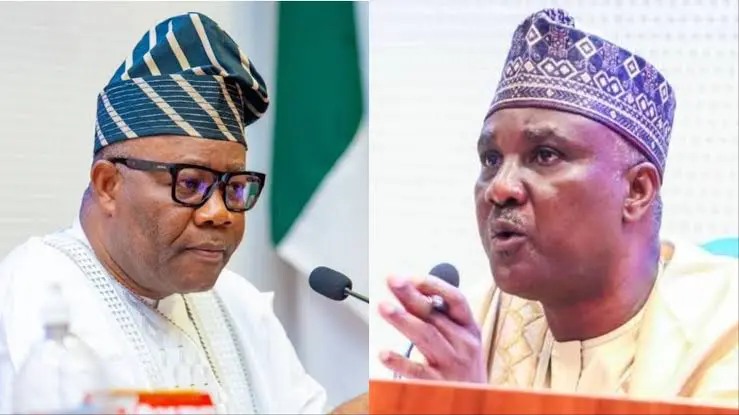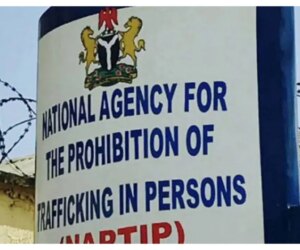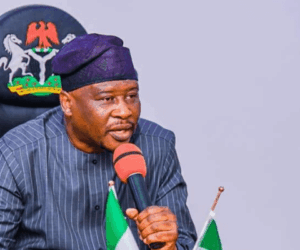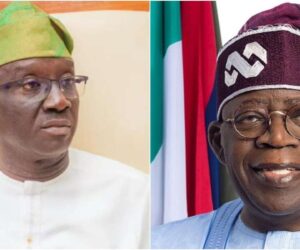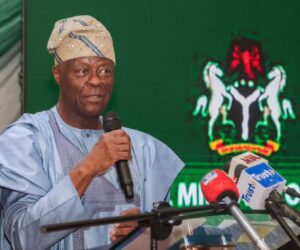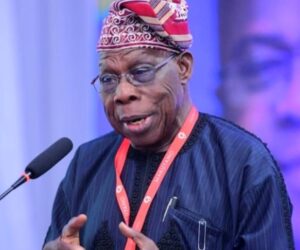2
Samuel Ogidan
President of the Senate, Godswill Akpabio and the Speaker of the House of Representatives, Rt Hon Tajudeen Abbas, have been charged to take decisive action following the recent designation of Nigeria as a “Country of Particular Concern” (CPC) by the United States government and ongoing violations of religious freedom across Nigeria.
The Global Coalition for Freedom of Religion in Nigeria (GCFRN), which made this call on Thursday in Abuja, noted that the Nigeria’s religious freedom crisis demands urgent legislative action.
GCFRN, in a statement by Emmanuel Ogebe, Esq., Justice for Jos Project, Washington, USA, Hon. Rimamnde Shawulu Kwewum, Middle Belt Dialogue, Abuja, Dr. Sam Amadi, Coordinator, Christian Network for Justice and Community, Abuja and seven others, warned the National Assembly that before sending a delegation to the United State, they must first and foremost address the documented violations within Nigeria.
GCFRN said: “We appeal to the Senate President, His Excellency Senator Godswill Obot Akpabio, CON, and the Speaker of the House of Representatives, His Excellency Rt Hon Tajudeen Abbas, CON, to take immediate and decisive action to address these pressing concerns.
“Reports suggest that the National Assembly is planning a delegation to the United States to respond to congressional engagement over religious freedom issues. We caution that such a delegation, without first addressing the documented violations within Nigeria, risks international ridicule and undermines Nigeria’s credibility. The facts on the ground are clear, well-documented, and irrefutable. Denial without corrective action could be interpreted as governmental complicity or weakness.
“The 2025 report by the United States Commission on International Religious Freedom (USCIRF) recommends Nigeria’s designation as a CPC due to serious violations of religious freedom. These concerns are not new; similar recommendations have been made repeatedly over the past two decades. The USCIRF report cites a range of issues, including blasphemy laws, Sharia codes, forced closures of Christian-affiliated schools, abductions, killings, and ethno-religious tensions—particularly in Northern Nigeria and the Federal Capital Territory.
“The challenges facing Christians in Nigeria, particularly in the North, have historical roots. During British colonial rule, missionary activities were restricted in many areas now operating Sharia law. Conversion out of Islam was forbidden, and Christians faced systemic barriers to worship, education, and legal recognition. Today, twelve northern states continue to enforce Sharia codes that disproportionately restrict Christian expression and access to rights afforded to Muslims.”
The group also noted that “Christians face systemic discrimination in public institutions, access to land, and the construction of places of worship. In states like Kano, Katsina, Sokoto, and Borno, Christians struggle to obtain Certificates of Occupancy for churches, while mosques flourish even on private lands. Universities routinely deny Christian students access to worship facilities, forcing them to meet under trees or in inadequate spaces. The destruction of churches during past conflicts and the slow recovery process highlight continued neglect and injustice.
“Abductions and forced conversions remain an ongoing crisis. Many Christian girls remain in captivity, including those taken by Boko Haram, ISWAP, and other actors. Cases like Leah Sharibu, and the unresolved status of over 80 Chibok girls, underscore the government’s inability—or unwillingness—to ensure the safety and rights of its citizens. Reports of forced conversions, marriages, and sexual exploitation remain widespread across northern states.”
GCFRN noted that government’s complicity in the whole episode, adding that there’s lack of prosecution for targeted attacks on Christians.
“Government complicity is evident in the lack of prosecution for targeted attacks on Christians, including the murders of Deborah Emmanuel in Sokoto and Eunice Olawale in Abuja. Post-election violence in 2011, which destroyed hundreds of churches and Christian properties, saw minimal accountability. The current administration, with a Muslim-Muslim leadership, has not addressed these historical imbalances, further deepening fear, marginalization, and impunity.
“The National Assembly must take immediate legislative action to rectify these systemic violations. Key measures include investigating religious freedom abuses, repealing unconstitutional blasphemy laws, and ensuring equitable access to land for Christian worship. Establishing a National Board for Christian Religious Studies or ensuring parity in funding with the National Board for Arabic and Islamic Studies is critical for fairness and constitutional compliance.
“Christian students must not be compelled to study Islamic religious courses or observe Islamic practices. Laws must be enacted to protect the autonomy of Christian educational institutions and ensure that all Nigerians can freely practice their faith without coercion or discrimination.
“Security agencies and religious policing entities such as Hisbah and Sharia Commissions must be outlawed where they violate constitutional rights. The federal government must reclaim communities seized by insurgents and restore them to indigenous populations, ensuring displaced citizens are resettled safely.
“Accountability for unresolved cases, including Leah Sharibu and Chibok girls, must be enforced. Released victims must be returned to their families, and perpetrators prosecuted. The National Assembly should also amend the Human Rights Commission Act to include monitoring and investigation of religious freedom violations.
“We urge the National Assembly to hold hearings on the state of religious freedom in Nigeria. GCFRN, along with its partner organizations, stands ready to provide comprehensive data and firsthand accounts to inform these proceedings. Legislative inaction risks further international scrutiny and damage to Nigeria’s global standing.
“The repeated designation of Nigeria as a CPC reflects both ongoing violations and governmental inaction. Urgent legislative and executive measures are required to restore confidence in Nigeria’s commitment to religious freedom, equality, and constitutional governance,” the group said.
GCFRN, has, however, called on the National Assembly to lead with courage and impartiality, addressing both historical grievances and current violations to ensure that every Nigerian, regardless of faith, can live without fear, coercion, or discrimination.
“We extend our highest regards to the Senate President and Speaker of the House of Representatives and reaffirm our commitment to supporting legislative and civic initiatives that uphold the Constitution of the Federal Republic of Nigeria and guarantee freedom of thought, conscience, and religion for all citizens,” GCFRN said.

